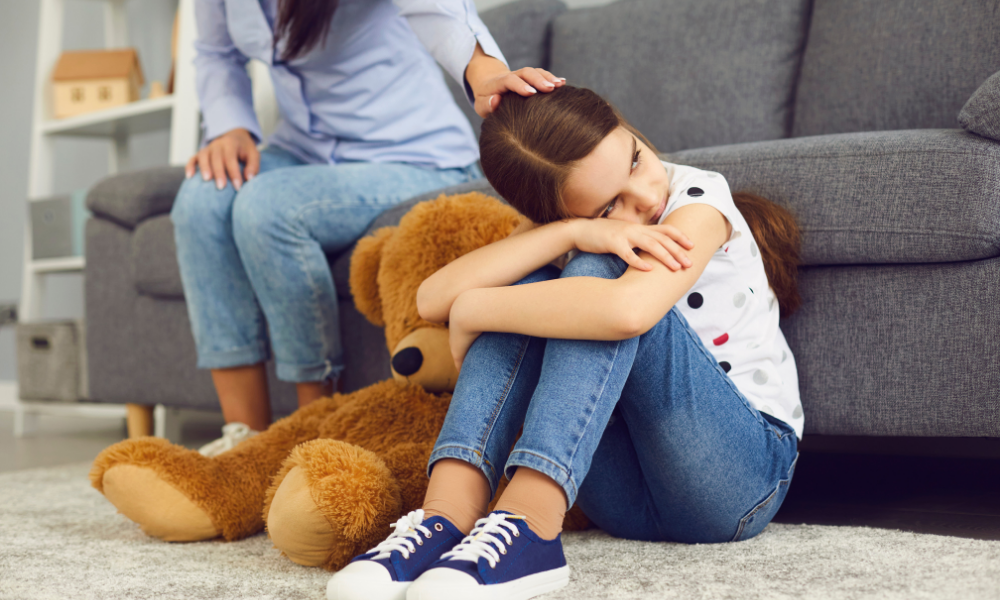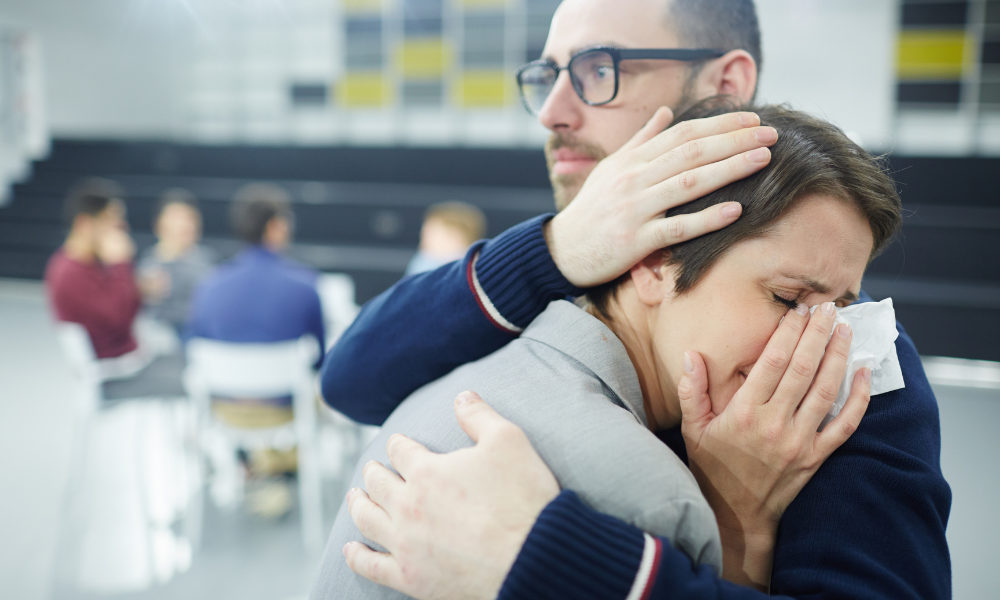How to Talk to Young Children About a School Shooting [UPDATED WITH REAL QUESTIONS FROM KIDS]
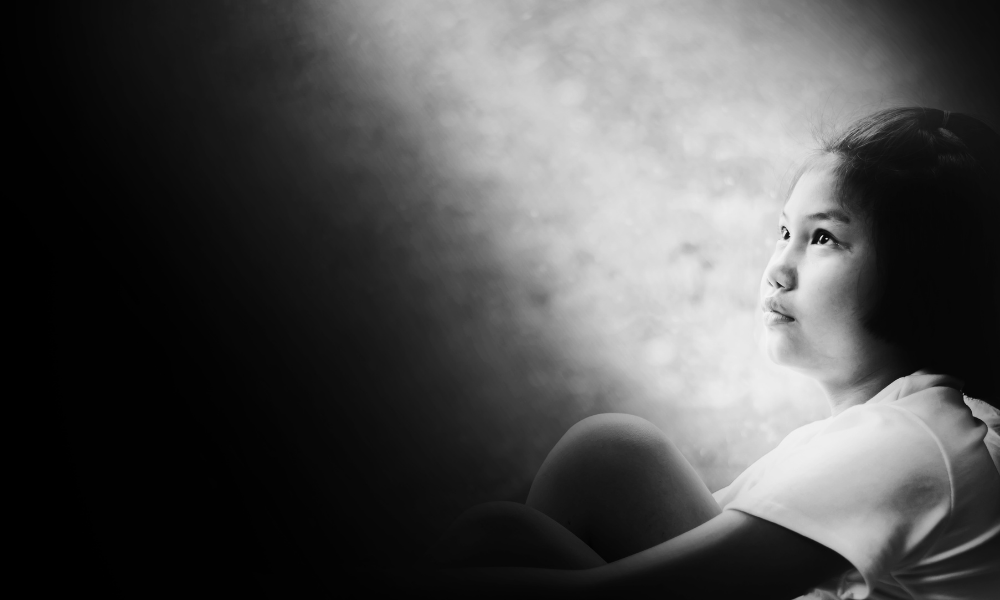
Published Date: 05/25/22
By Stacey Grumet
In this article
- How should I tell my child about a school shooting?
- What should I tell my children about a school shooting?
- How can I help my child cope with their emotions after a school shooting?
- What should I say if my child asks if a shooting will happen at their school?
- What should I say when my child asks why a school shooting happened?
- Resources for parents to help children cope with traumatic events, including school shootings
- Resources for children to help cope with a school schooting, and other traumatic events
- UPDATE: Questions from my 6-year-old
I write this with a lump in my throat and pain in my heart. But in the wake of the events at Robb Elementary School in Uvalde, Texas, I’m bracing myself to sit down with my own 6-year-old to discuss school shootings.
I went to elementary school in the 1980s – the Cold War era. I remember duck and cover drills and hearing about the U.S.S.R. – my parents certainly didn’t do anything to shield us from the nightly news. It was how people got their information back then.
I remember the Challenger explosion. Watching those seven astronauts perish in a fireball must have been traumatic.
And airplane hijackings weren’t uncommon in the late 70s and throughout the 80s. I heard about them all the time, but don’t remember being scared to get on a plane.
These events all felt abstract. Certainly, the concept of nuclear war was too big for my 8-year-old brain. Like we were never really going to have to hide under our desks – it was no different than a fire drill. Of course, as an adult I know that’s not the case for children who grow up in war torn nations. Some children do have to hide at school. Sometimes it’s our own children.
Following this unspeakable tragedy in Uvalde that we must speak about, I’m sharing information on how you can go about discussing school shootings with your children so that they feel supported and safe.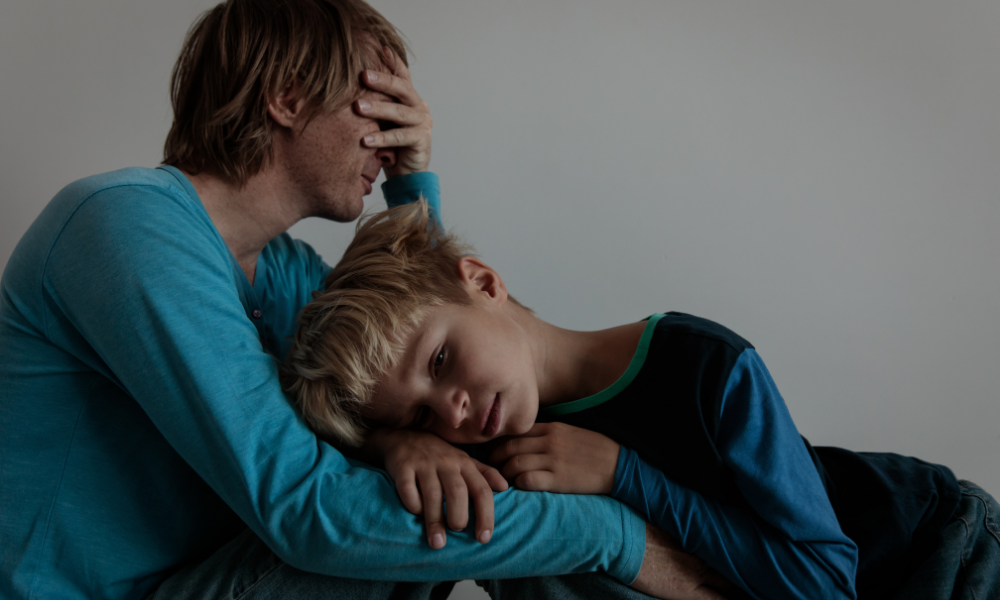
How should I tell my children about a school shooting?
In an ideal world, you’d never have to. That goes without saying.
But there are better ways than others to approach it.
Discuss tragedies at the appropriate time
That’s so horrible to write after a school shooting – is there ever an appropriate time to discuss it, especially with children? No, but there are times that are and aren’t recommended.
Pick a time that isn’t rushed so you’ll be available to answer any questions your child may have. Do your best to deliver the news, rather than letting them learn about it elsewhere. Avoid having the conversation at bedtime, as it may lead to nightmares.
Dr. Paramjit Joshi of Children's National Medical Center, says acknowledging the event is critical.
Use age-appropriate language
Preschoolers often become interested in the idea of death but can’t conceptualize abstract concepts like ‘forever’. They don’t understand that death is irreversible and often lack emotion when discussing it. They also take take nearly everything literally, so when you tell them that someone is now in the sky, they believe the person is living in the sky in the same way they used to live down the street.
Between 5-7 years old, children begin to understand that death is permanent. They may believe that something they did or said caused a person’s or animal’s death and they may begin fearing their own death, or the deaths of loved ones.
Take your child’s age and their own understanding of death into account when you discuss a school shooting. Avoid telling children that a person went to sleep or using other euphemisms. Children can internalize this and develop a fear of going to sleep.
Share your own feelings, but avoid discussing your fear
A school shooting sends fear down the spines of every parent, however tread carefully when you’re speaking about these fears. You want to avoid scaring your child more than they already may be, and children are more apt to be scared when they know adults are fearful.
You may also be feeling angry, sad, confused, and even somewhat lost. Share these feelings with your children, as it gives them permission to feel the way they feel and express their emotions.
What should I tell my children about a school shootng?
I wish we never had to tell any child about a school shooting. But here we are again.
Share the right amount of information It’s important to be honest about the situation. The level of honesty you provide will depend on your child’s age and their personality.
You may decide to provide a child who is prone to anxiety fewer details than a child with an easy-going demeanor. The younger the child, the less information you should share, generally speaking.
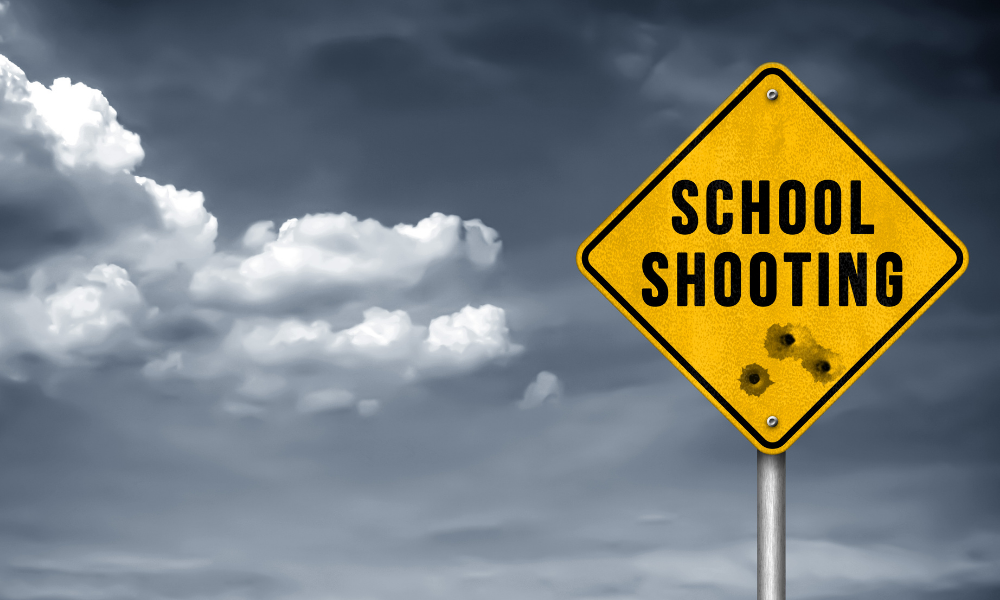
Avoid violent details
Do not share more details of the violence of the event than necessary. Young children do not need to know the particulars and they can be shielded from hearing about the brutality of the circumstances.
Look for the helpers
The very wise Mr. Rogers shared that his very wise mother taught him to “look for the helpers” when he was exposed to scary events. This helps children – and adults – remember that there is good in this world without ignoring the gravity of the situation.
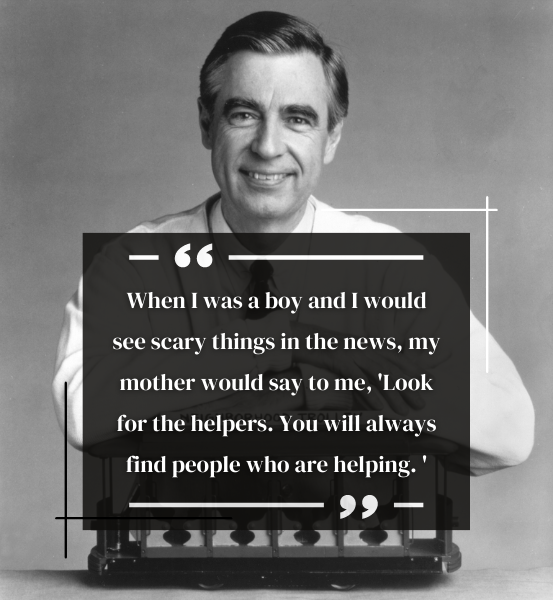
How can I help my child cope with their emotions after a school shooting?
Helping children to learn to express their emotions in a healthy way and process grief is crucial.
Ask your child how they’re feeling
Like you, children may be feeling a wide range of emotions when they learn about a school shooting. And one of them is likely to be fear.
As a parent, I know it may feel impossible for you to believe that children will ever be safe at school again. Even if you’re not convinced, you must convince young child that they are safe.
Address other emotions appropriately. Avoid using empathy blockers, which are attempts to distract a person from how they’re feeling and get them to move on, whether or not they’re ready. Explain that it’s okay that your child feels the way they do, keeping in mind that they may be very curious about the events.

Ask if they’d like to help
Young children may feel helpless – many adults may also feel this way. But emotions can fuel action and those actions can both help victims of a school shooting, and you and your child process grief.
Of course, taking action means different things to different people. Here are some ways you can help:
- Involve yourself and your family in organizations like Everytown for Gun Safety or Moms Demand Action
- Donate to a victims’ fund that is raising money for the families in Uvalde, Texas – if you give your child an allowance, they may decide to make a donation of their own. Go Fund Me has set up this page so you know your donation will toward legitimate funds.
- Send sympathy cards to families affected, helping children with appropriate wording
- Rushing-Estes-Knowles Mortuary and Hillcrest Memorial have offered funeral services at no cost to families - sympathy cards can be sent to both
- Teach your children about the importance of voting – while this is less immediate than the other tactics listed, teaching children about our legislative process early on helps them develop into involved citizens.
You can also spend a few minutes brainstorming ways to help school shooting victims with your own child. You might suggest having your own fundraiser – something big that involves others, or something small, like a lemonade stand.
Give your child coping strategies to deal with grief
One of the most important ways you can help your child process grief is by simply being there for them when they want to discuss what occurred. It’s difficult and uncomfortable and heartbreaking to talk about a school shooting but avoiding it can lead to children using unhealthy coping strategies. Model ways to process it – if they hear you having outbursts, you can expect them to do the same.
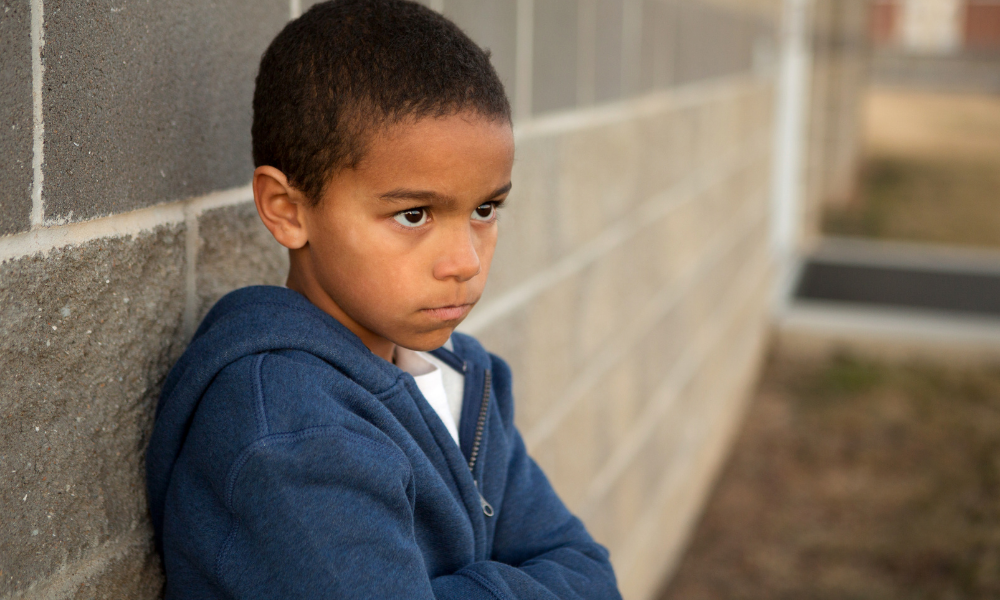
Tell them who else they can speak with
Especially in the immediate days following a school shooting, your child may be hearing a lot of information – and misinformation – at from other children.
Make sure they have a trusted adult at their school who they can go to if they’re feeling overwhelmed. If you think your child might get very emotional at school, let their teacher and the administration know in advance that they might need extra support.
If possible, give them the names of specific relatives or close friends who you believe can have age-appropriate discussions with your child and provide them the comfort they need.
If your children are young enough that they wouldn’t have heard about a shooting on their own, let them know that other parents may not have discussed it with their children. Other children may be scared when they hear about it, so ask them to involve an adult if kids start discussing it privately.
If you see indications that your child is having an unusually difficult time processing their grief, don’t hesitate to get them into counseling.

What should I say if my child asks if a shooting will happen at their school?
My sigh was so heavy when I wrote that.
Give an age-appropriate response
For preschool children, the best thing to tell them is that it won’t happen. While I’m not an advocate of lying to children, they simply can’t understand remote odds. Give them the security and reassurance they need.
For school-age children, it depends on their age and their maturity level. Never compare it to something else that can frighten them like, “It’s more likely we’ll get in a car accident.”
You can say that it’s really unlikely that it will happen and that it’s important that they don’t fear going to school. Remind them of the safety protocols their school has in place, and that they should always tell a trusted adult if they hear rumors that someone is planning to do something.
What should you say when my child asks why a school shooting happened?
Explaining to a child why a school shooting occurred isn’t easy. It’s difficult for most adults to wrap their heads around.
It’s okay to say that we don’t always know why some people decide to do bad things and remind children that most people don’t make these decisions.
Resources for Parents to Help Children Cope with Traumatic Events, including School Shootings
Helping Children with Tragic Events in the News (PBS Kids)
Age-related Reactions to Tragic Events (National Child Traumatic Stress Network)
Parent Guidelines for Helping Youth After the Recent Shooting (National Child Traumatic Stress Network)
Federal Resources for Helping Youth Cope After a School Shooting (youth.gov)
Resources for Children to Help Cope with a School Shooting, and Other Traumatic Events
We encourage you to review all materials prior to showing them to your children to determine their appropriateness for your family.
Videos
Traumatic Experiences (Sesame Street)
What is Trauma? (University of Kentucky Center on Trauma and Children)
Daniel Tiger’s Neighborhood - Remembering Blue Fish (preschool)
Something Very Sad Happened (ages 2-4)
Ida, Always (preschool-age 8)
The Dead Bird (ages 4-7)
Sad Isn’t Bad (ages 4-8)
What is Death? (ages 6-9)
The Fall of Freddie the Leaf: A Story of Life for All Ages (ages 4-8)
I Miss You: A First Look at Death (ages 3-7)
The Saddest Time (ages 6-10)
Our hearts are broken. Children’s lives have been taken and another community has been devastated in another school shooting. The situation is impossible to understand, but as parents, we can try our best to help children cope with this tragedy.
UPDATE: Questions about the Uvalde school shooting from a 6-year-old
I wanted to provide questions that my own 6-year-old asked when I told her about the school shooting in Uvlade, Texas.
It didn’t come as a surprise to me that she didn’t really grasp the gravity of the situation. She asked a lot of questions, and she was not emotional about the shooting initially.
Later in the day, she called me into her room, asked even more questions, and told me she was sad. She knows how said I am – I was choking back tears when discussing it with her.
I asked her if she felt afraid to go to school, and she said she wasn’t. I asked if she believed that I would not send her to a place that I thought was unsafe, and she said yes.
Some of these questions may sound callous, but they’re all reasonable questions from a 6-year-old who does not yet have the capacity to comprehend a school shooting.
Questions about the victims at Robb Elementary
How many kids died?
How old were they?
How old were the teachers?
So, the parents don't have kid anymore?
What did they do with the people after they died?
How did they call police if they were shot?
Questions about the school shooter
Why did he shoot kids?
What was his name?
How old was he?
Where did he get a gun?
Did he go to jail?
Where are his parents?
Questions about the environment
Where were the kids in the school?
How did he get into the school?
Was it loud?
Questions about law enforcement
Who stopped him?
Were there lots of ambulances?
How many police came?
Paper Pinecone is the #1 most trusted childcare directory giving parents access to the best preschools and best daycares near you. Parents always search free and childcare providers always list free. Send inquiries about the best daycares and preschools to [email protected].
Note: Any proceeds from affiliate links will be donated to the funds raising money for victims’ families of the Uvalde school shooting
About the Author
Stacey Grumet is the Founder & CEO of Paper Pinecone and a mom devestated by senseless school shootings. She urges everyone to do their part to enact meaningful gun reform.
- stacey's blog
- Log in or register to post comments
